NIP3013: Analyzing 'Prioritizing People' in Nursing - NMC Code Essay
VerifiedAdded on 2023/04/23
|15
|5046
|404
Essay
AI Summary
This essay provides a reflective analysis of the Nursing and Midwifery Council (NMC) code, specifically focusing on the 'prioritize people' category, using the Gibbs’s reflective model and Benner’s theory. It discusses two episodes of care where the author demonstrated commitment to patient-centered and culturally competent care. The first episode involves an Islamic patient where the author highlights the importance of respecting cultural preferences and ensuring patient involvement in decision-making. The second episode addresses challenges in managing a patient with diabetes and obesity. The reflection emphasizes the significance of maintaining patient dignity, autonomy, and cultural sensitivity in nursing practice, ultimately aiming to enhance patient satisfaction and improve health outcomes. The author assesses their competence level based on Benner's model, identifying areas for further development and continuous learning.
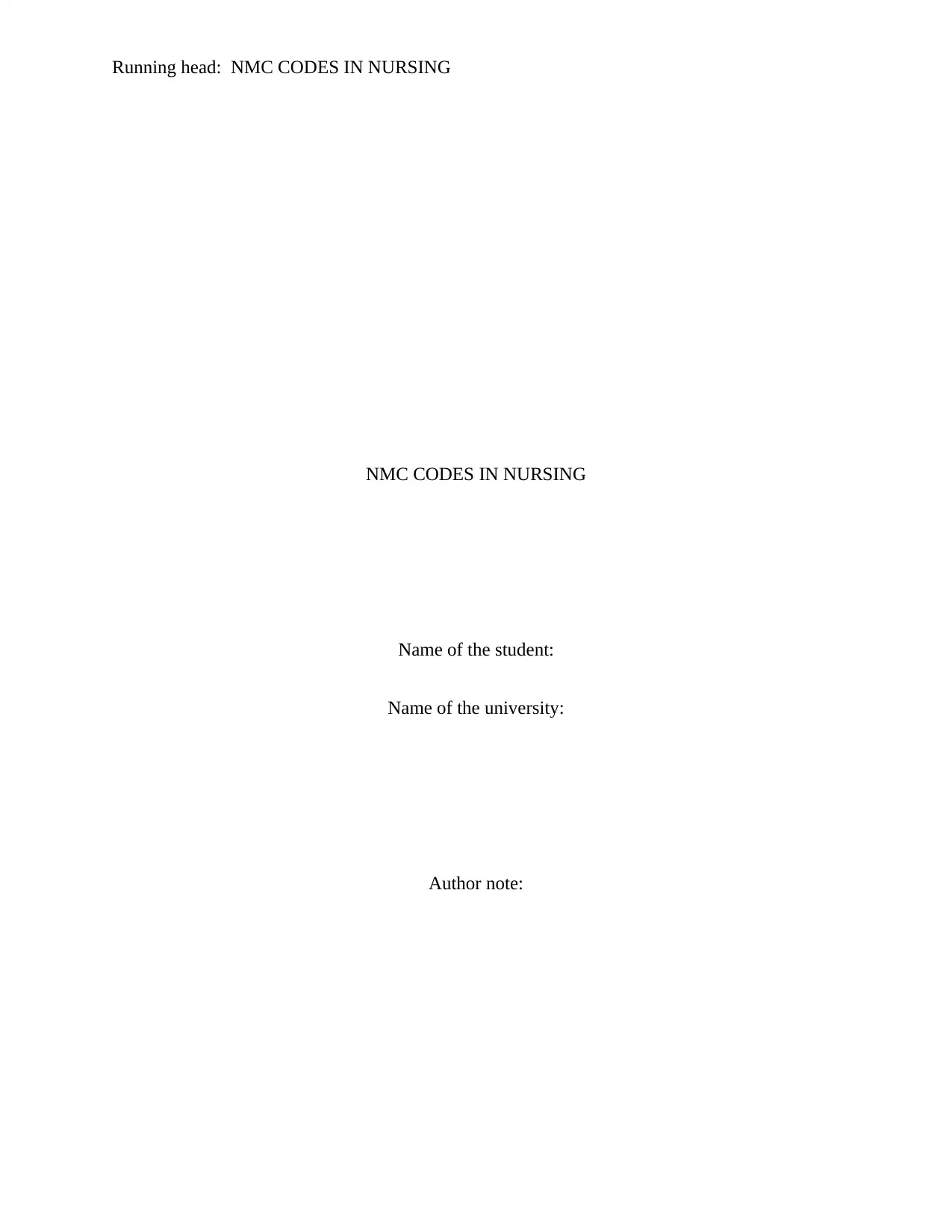
Running head: NMC CODES IN NURSING
NMC CODES IN NURSING
Name of the student:
Name of the university:
Author note:
NMC CODES IN NURSING
Name of the student:
Name of the university:
Author note:
Paraphrase This Document
Need a fresh take? Get an instant paraphrase of this document with our AI Paraphraser
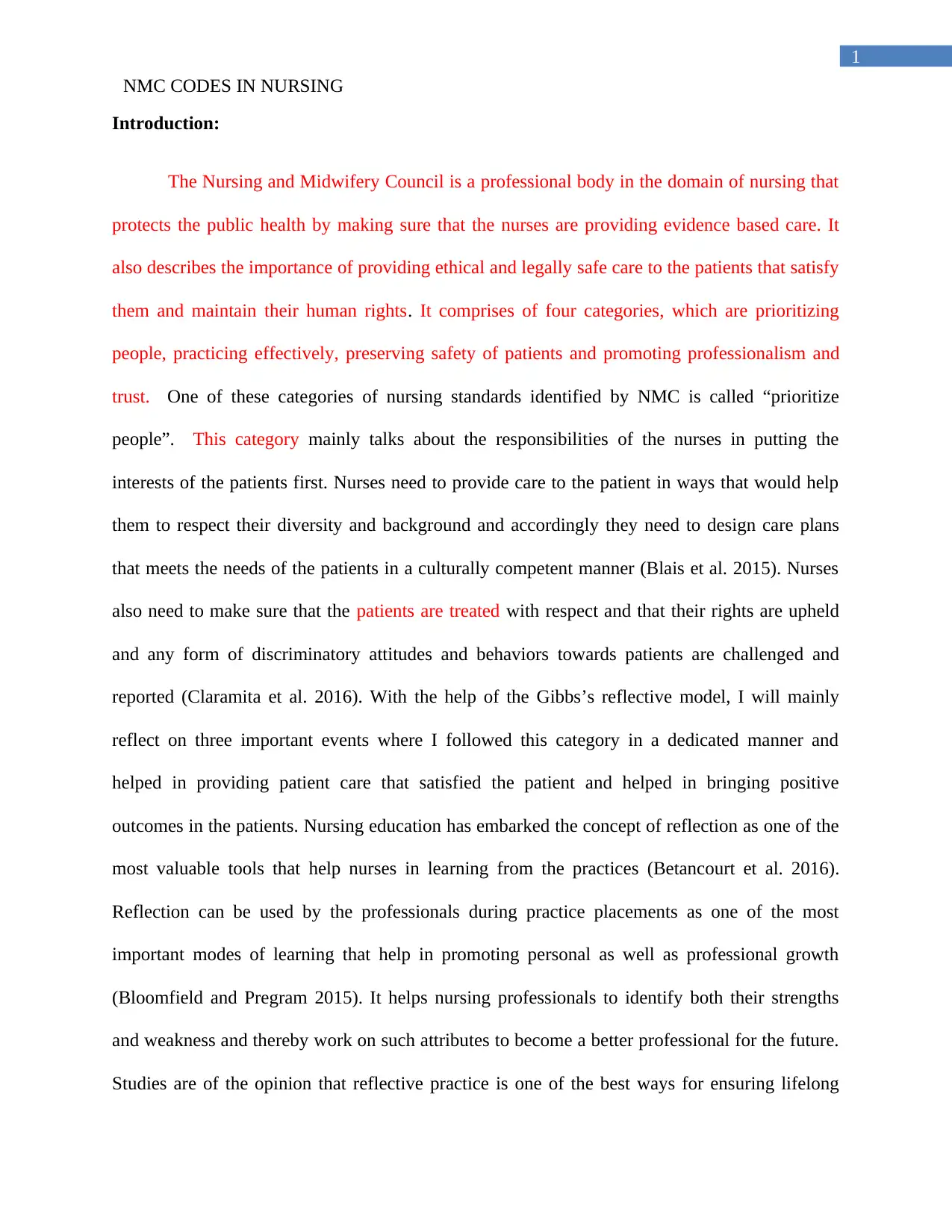
1
NMC CODES IN NURSING
Introduction:
The Nursing and Midwifery Council is a professional body in the domain of nursing that
protects the public health by making sure that the nurses are providing evidence based care. It
also describes the importance of providing ethical and legally safe care to the patients that satisfy
them and maintain their human rights. It comprises of four categories, which are prioritizing
people, practicing effectively, preserving safety of patients and promoting professionalism and
trust. One of these categories of nursing standards identified by NMC is called “prioritize
people”. This category mainly talks about the responsibilities of the nurses in putting the
interests of the patients first. Nurses need to provide care to the patient in ways that would help
them to respect their diversity and background and accordingly they need to design care plans
that meets the needs of the patients in a culturally competent manner (Blais et al. 2015). Nurses
also need to make sure that the patients are treated with respect and that their rights are upheld
and any form of discriminatory attitudes and behaviors towards patients are challenged and
reported (Claramita et al. 2016). With the help of the Gibbs’s reflective model, I will mainly
reflect on three important events where I followed this category in a dedicated manner and
helped in providing patient care that satisfied the patient and helped in bringing positive
outcomes in the patients. Nursing education has embarked the concept of reflection as one of the
most valuable tools that help nurses in learning from the practices (Betancourt et al. 2016).
Reflection can be used by the professionals during practice placements as one of the most
important modes of learning that help in promoting personal as well as professional growth
(Bloomfield and Pregram 2015). It helps nursing professionals to identify both their strengths
and weakness and thereby work on such attributes to become a better professional for the future.
Studies are of the opinion that reflective practice is one of the best ways for ensuring lifelong
NMC CODES IN NURSING
Introduction:
The Nursing and Midwifery Council is a professional body in the domain of nursing that
protects the public health by making sure that the nurses are providing evidence based care. It
also describes the importance of providing ethical and legally safe care to the patients that satisfy
them and maintain their human rights. It comprises of four categories, which are prioritizing
people, practicing effectively, preserving safety of patients and promoting professionalism and
trust. One of these categories of nursing standards identified by NMC is called “prioritize
people”. This category mainly talks about the responsibilities of the nurses in putting the
interests of the patients first. Nurses need to provide care to the patient in ways that would help
them to respect their diversity and background and accordingly they need to design care plans
that meets the needs of the patients in a culturally competent manner (Blais et al. 2015). Nurses
also need to make sure that the patients are treated with respect and that their rights are upheld
and any form of discriminatory attitudes and behaviors towards patients are challenged and
reported (Claramita et al. 2016). With the help of the Gibbs’s reflective model, I will mainly
reflect on three important events where I followed this category in a dedicated manner and
helped in providing patient care that satisfied the patient and helped in bringing positive
outcomes in the patients. Nursing education has embarked the concept of reflection as one of the
most valuable tools that help nurses in learning from the practices (Betancourt et al. 2016).
Reflection can be used by the professionals during practice placements as one of the most
important modes of learning that help in promoting personal as well as professional growth
(Bloomfield and Pregram 2015). It helps nursing professionals to identify both their strengths
and weakness and thereby work on such attributes to become a better professional for the future.
Studies are of the opinion that reflective practice is one of the best ways for ensuring lifelong
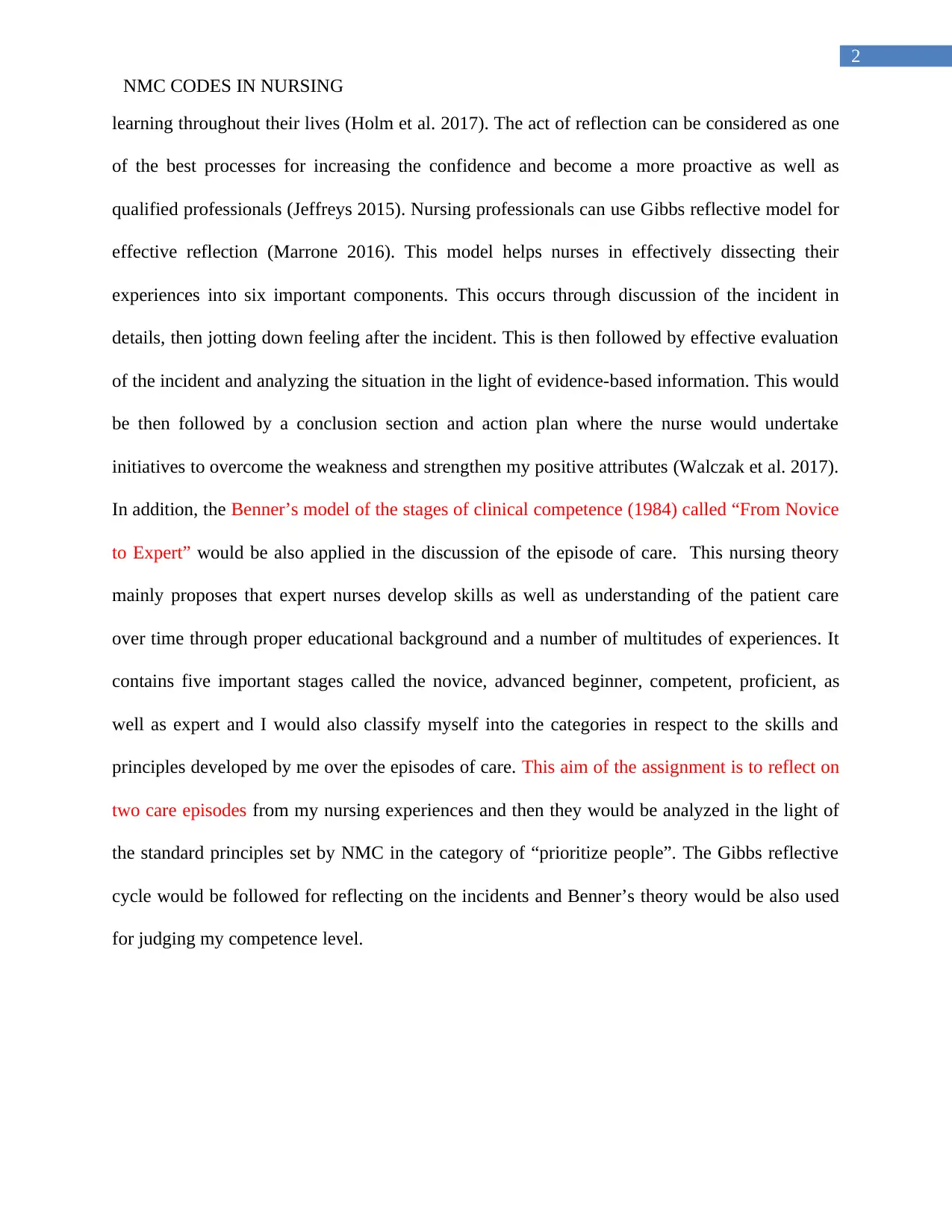
2
NMC CODES IN NURSING
learning throughout their lives (Holm et al. 2017). The act of reflection can be considered as one
of the best processes for increasing the confidence and become a more proactive as well as
qualified professionals (Jeffreys 2015). Nursing professionals can use Gibbs reflective model for
effective reflection (Marrone 2016). This model helps nurses in effectively dissecting their
experiences into six important components. This occurs through discussion of the incident in
details, then jotting down feeling after the incident. This is then followed by effective evaluation
of the incident and analyzing the situation in the light of evidence-based information. This would
be then followed by a conclusion section and action plan where the nurse would undertake
initiatives to overcome the weakness and strengthen my positive attributes (Walczak et al. 2017).
In addition, the Benner’s model of the stages of clinical competence (1984) called “From Novice
to Expert” would be also applied in the discussion of the episode of care. This nursing theory
mainly proposes that expert nurses develop skills as well as understanding of the patient care
over time through proper educational background and a number of multitudes of experiences. It
contains five important stages called the novice, advanced beginner, competent, proficient, as
well as expert and I would also classify myself into the categories in respect to the skills and
principles developed by me over the episodes of care. This aim of the assignment is to reflect on
two care episodes from my nursing experiences and then they would be analyzed in the light of
the standard principles set by NMC in the category of “prioritize people”. The Gibbs reflective
cycle would be followed for reflecting on the incidents and Benner’s theory would be also used
for judging my competence level.
NMC CODES IN NURSING
learning throughout their lives (Holm et al. 2017). The act of reflection can be considered as one
of the best processes for increasing the confidence and become a more proactive as well as
qualified professionals (Jeffreys 2015). Nursing professionals can use Gibbs reflective model for
effective reflection (Marrone 2016). This model helps nurses in effectively dissecting their
experiences into six important components. This occurs through discussion of the incident in
details, then jotting down feeling after the incident. This is then followed by effective evaluation
of the incident and analyzing the situation in the light of evidence-based information. This would
be then followed by a conclusion section and action plan where the nurse would undertake
initiatives to overcome the weakness and strengthen my positive attributes (Walczak et al. 2017).
In addition, the Benner’s model of the stages of clinical competence (1984) called “From Novice
to Expert” would be also applied in the discussion of the episode of care. This nursing theory
mainly proposes that expert nurses develop skills as well as understanding of the patient care
over time through proper educational background and a number of multitudes of experiences. It
contains five important stages called the novice, advanced beginner, competent, proficient, as
well as expert and I would also classify myself into the categories in respect to the skills and
principles developed by me over the episodes of care. This aim of the assignment is to reflect on
two care episodes from my nursing experiences and then they would be analyzed in the light of
the standard principles set by NMC in the category of “prioritize people”. The Gibbs reflective
cycle would be followed for reflecting on the incidents and Benner’s theory would be also used
for judging my competence level.
⊘ This is a preview!⊘
Do you want full access?
Subscribe today to unlock all pages.

Trusted by 1+ million students worldwide
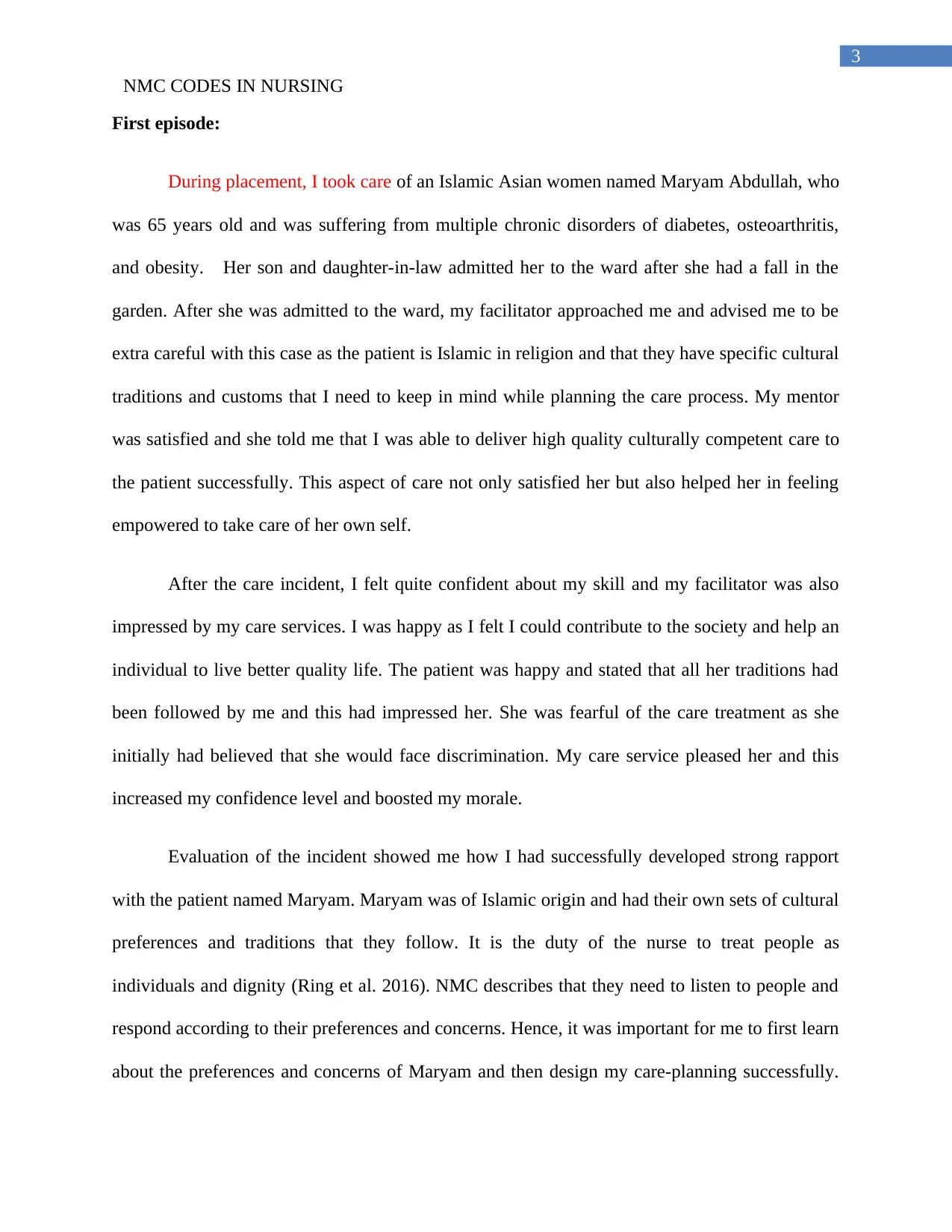
3
NMC CODES IN NURSING
First episode:
During placement, I took care of an Islamic Asian women named Maryam Abdullah, who
was 65 years old and was suffering from multiple chronic disorders of diabetes, osteoarthritis,
and obesity. Her son and daughter-in-law admitted her to the ward after she had a fall in the
garden. After she was admitted to the ward, my facilitator approached me and advised me to be
extra careful with this case as the patient is Islamic in religion and that they have specific cultural
traditions and customs that I need to keep in mind while planning the care process. My mentor
was satisfied and she told me that I was able to deliver high quality culturally competent care to
the patient successfully. This aspect of care not only satisfied her but also helped her in feeling
empowered to take care of her own self.
After the care incident, I felt quite confident about my skill and my facilitator was also
impressed by my care services. I was happy as I felt I could contribute to the society and help an
individual to live better quality life. The patient was happy and stated that all her traditions had
been followed by me and this had impressed her. She was fearful of the care treatment as she
initially had believed that she would face discrimination. My care service pleased her and this
increased my confidence level and boosted my morale.
Evaluation of the incident showed me how I had successfully developed strong rapport
with the patient named Maryam. Maryam was of Islamic origin and had their own sets of cultural
preferences and traditions that they follow. It is the duty of the nurse to treat people as
individuals and dignity (Ring et al. 2016). NMC describes that they need to listen to people and
respond according to their preferences and concerns. Hence, it was important for me to first learn
about the preferences and concerns of Maryam and then design my care-planning successfully.
NMC CODES IN NURSING
First episode:
During placement, I took care of an Islamic Asian women named Maryam Abdullah, who
was 65 years old and was suffering from multiple chronic disorders of diabetes, osteoarthritis,
and obesity. Her son and daughter-in-law admitted her to the ward after she had a fall in the
garden. After she was admitted to the ward, my facilitator approached me and advised me to be
extra careful with this case as the patient is Islamic in religion and that they have specific cultural
traditions and customs that I need to keep in mind while planning the care process. My mentor
was satisfied and she told me that I was able to deliver high quality culturally competent care to
the patient successfully. This aspect of care not only satisfied her but also helped her in feeling
empowered to take care of her own self.
After the care incident, I felt quite confident about my skill and my facilitator was also
impressed by my care services. I was happy as I felt I could contribute to the society and help an
individual to live better quality life. The patient was happy and stated that all her traditions had
been followed by me and this had impressed her. She was fearful of the care treatment as she
initially had believed that she would face discrimination. My care service pleased her and this
increased my confidence level and boosted my morale.
Evaluation of the incident showed me how I had successfully developed strong rapport
with the patient named Maryam. Maryam was of Islamic origin and had their own sets of cultural
preferences and traditions that they follow. It is the duty of the nurse to treat people as
individuals and dignity (Ring et al. 2016). NMC describes that they need to listen to people and
respond according to their preferences and concerns. Hence, it was important for me to first learn
about the preferences and concerns of Maryam and then design my care-planning successfully.
Paraphrase This Document
Need a fresh take? Get an instant paraphrase of this document with our AI Paraphraser
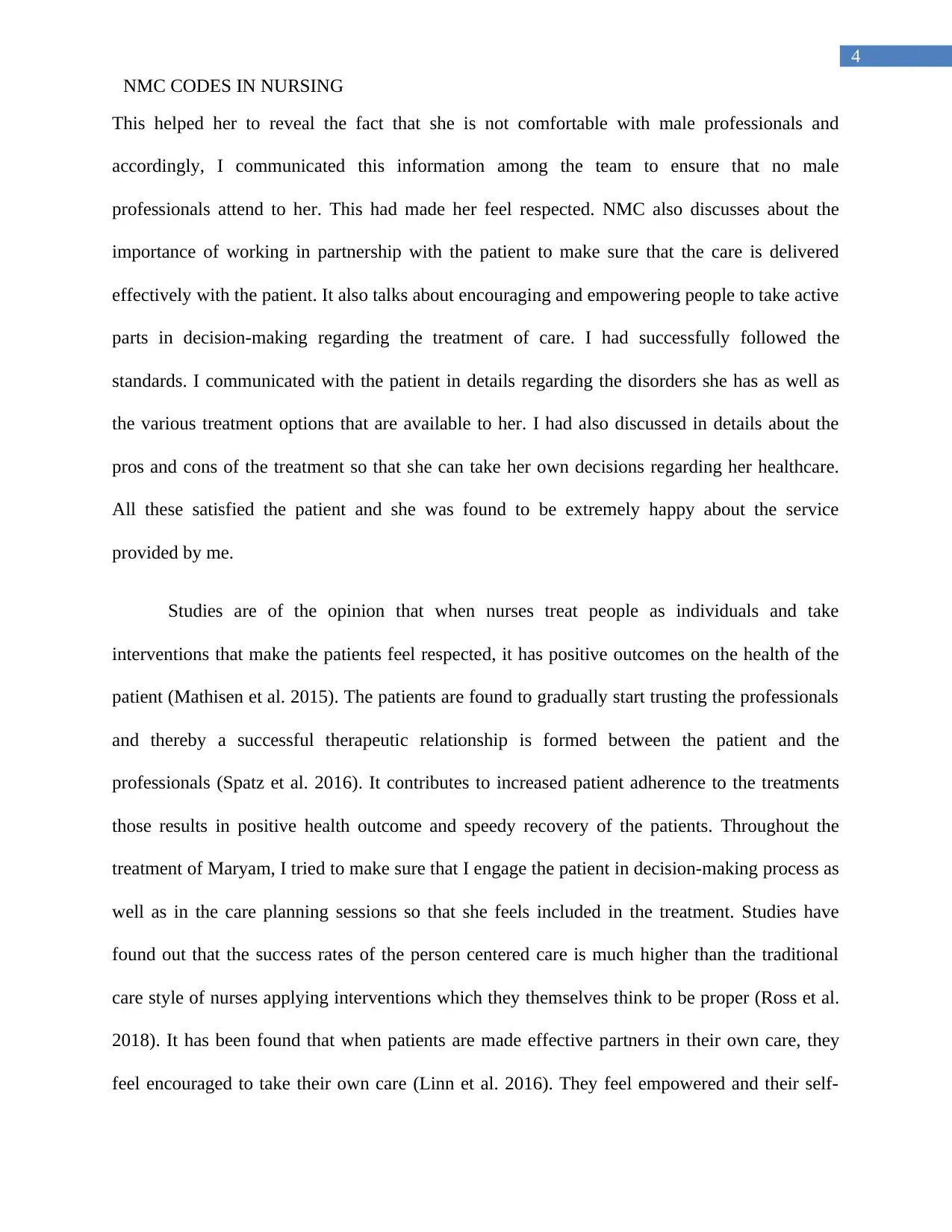
4
NMC CODES IN NURSING
This helped her to reveal the fact that she is not comfortable with male professionals and
accordingly, I communicated this information among the team to ensure that no male
professionals attend to her. This had made her feel respected. NMC also discusses about the
importance of working in partnership with the patient to make sure that the care is delivered
effectively with the patient. It also talks about encouraging and empowering people to take active
parts in decision-making regarding the treatment of care. I had successfully followed the
standards. I communicated with the patient in details regarding the disorders she has as well as
the various treatment options that are available to her. I had also discussed in details about the
pros and cons of the treatment so that she can take her own decisions regarding her healthcare.
All these satisfied the patient and she was found to be extremely happy about the service
provided by me.
Studies are of the opinion that when nurses treat people as individuals and take
interventions that make the patients feel respected, it has positive outcomes on the health of the
patient (Mathisen et al. 2015). The patients are found to gradually start trusting the professionals
and thereby a successful therapeutic relationship is formed between the patient and the
professionals (Spatz et al. 2016). It contributes to increased patient adherence to the treatments
those results in positive health outcome and speedy recovery of the patients. Throughout the
treatment of Maryam, I tried to make sure that I engage the patient in decision-making process as
well as in the care planning sessions so that she feels included in the treatment. Studies have
found out that the success rates of the person centered care is much higher than the traditional
care style of nurses applying interventions which they themselves think to be proper (Ross et al.
2018). It has been found that when patients are made effective partners in their own care, they
feel encouraged to take their own care (Linn et al. 2016). They feel empowered and their self-
NMC CODES IN NURSING
This helped her to reveal the fact that she is not comfortable with male professionals and
accordingly, I communicated this information among the team to ensure that no male
professionals attend to her. This had made her feel respected. NMC also discusses about the
importance of working in partnership with the patient to make sure that the care is delivered
effectively with the patient. It also talks about encouraging and empowering people to take active
parts in decision-making regarding the treatment of care. I had successfully followed the
standards. I communicated with the patient in details regarding the disorders she has as well as
the various treatment options that are available to her. I had also discussed in details about the
pros and cons of the treatment so that she can take her own decisions regarding her healthcare.
All these satisfied the patient and she was found to be extremely happy about the service
provided by me.
Studies are of the opinion that when nurses treat people as individuals and take
interventions that make the patients feel respected, it has positive outcomes on the health of the
patient (Mathisen et al. 2015). The patients are found to gradually start trusting the professionals
and thereby a successful therapeutic relationship is formed between the patient and the
professionals (Spatz et al. 2016). It contributes to increased patient adherence to the treatments
those results in positive health outcome and speedy recovery of the patients. Throughout the
treatment of Maryam, I tried to make sure that I engage the patient in decision-making process as
well as in the care planning sessions so that she feels included in the treatment. Studies have
found out that the success rates of the person centered care is much higher than the traditional
care style of nurses applying interventions which they themselves think to be proper (Ross et al.
2018). It has been found that when patients are made effective partners in their own care, they
feel encouraged to take their own care (Linn et al. 2016). They feel empowered and their self-
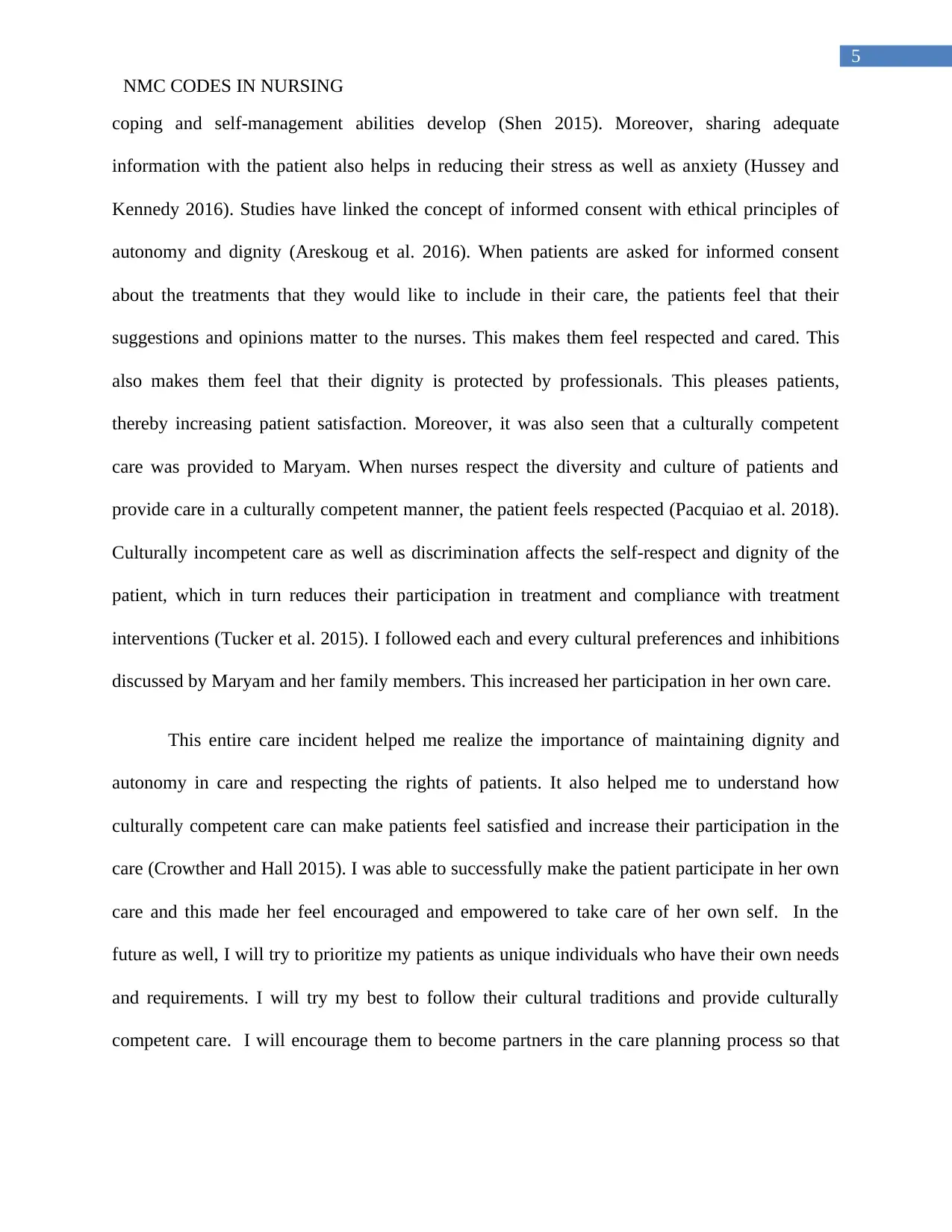
5
NMC CODES IN NURSING
coping and self-management abilities develop (Shen 2015). Moreover, sharing adequate
information with the patient also helps in reducing their stress as well as anxiety (Hussey and
Kennedy 2016). Studies have linked the concept of informed consent with ethical principles of
autonomy and dignity (Areskoug et al. 2016). When patients are asked for informed consent
about the treatments that they would like to include in their care, the patients feel that their
suggestions and opinions matter to the nurses. This makes them feel respected and cared. This
also makes them feel that their dignity is protected by professionals. This pleases patients,
thereby increasing patient satisfaction. Moreover, it was also seen that a culturally competent
care was provided to Maryam. When nurses respect the diversity and culture of patients and
provide care in a culturally competent manner, the patient feels respected (Pacquiao et al. 2018).
Culturally incompetent care as well as discrimination affects the self-respect and dignity of the
patient, which in turn reduces their participation in treatment and compliance with treatment
interventions (Tucker et al. 2015). I followed each and every cultural preferences and inhibitions
discussed by Maryam and her family members. This increased her participation in her own care.
This entire care incident helped me realize the importance of maintaining dignity and
autonomy in care and respecting the rights of patients. It also helped me to understand how
culturally competent care can make patients feel satisfied and increase their participation in the
care (Crowther and Hall 2015). I was able to successfully make the patient participate in her own
care and this made her feel encouraged and empowered to take care of her own self. In the
future as well, I will try to prioritize my patients as unique individuals who have their own needs
and requirements. I will try my best to follow their cultural traditions and provide culturally
competent care. I will encourage them to become partners in the care planning process so that
NMC CODES IN NURSING
coping and self-management abilities develop (Shen 2015). Moreover, sharing adequate
information with the patient also helps in reducing their stress as well as anxiety (Hussey and
Kennedy 2016). Studies have linked the concept of informed consent with ethical principles of
autonomy and dignity (Areskoug et al. 2016). When patients are asked for informed consent
about the treatments that they would like to include in their care, the patients feel that their
suggestions and opinions matter to the nurses. This makes them feel respected and cared. This
also makes them feel that their dignity is protected by professionals. This pleases patients,
thereby increasing patient satisfaction. Moreover, it was also seen that a culturally competent
care was provided to Maryam. When nurses respect the diversity and culture of patients and
provide care in a culturally competent manner, the patient feels respected (Pacquiao et al. 2018).
Culturally incompetent care as well as discrimination affects the self-respect and dignity of the
patient, which in turn reduces their participation in treatment and compliance with treatment
interventions (Tucker et al. 2015). I followed each and every cultural preferences and inhibitions
discussed by Maryam and her family members. This increased her participation in her own care.
This entire care incident helped me realize the importance of maintaining dignity and
autonomy in care and respecting the rights of patients. It also helped me to understand how
culturally competent care can make patients feel satisfied and increase their participation in the
care (Crowther and Hall 2015). I was able to successfully make the patient participate in her own
care and this made her feel encouraged and empowered to take care of her own self. In the
future as well, I will try to prioritize my patients as unique individuals who have their own needs
and requirements. I will try my best to follow their cultural traditions and provide culturally
competent care. I will encourage them to become partners in the care planning process so that
⊘ This is a preview!⊘
Do you want full access?
Subscribe today to unlock all pages.

Trusted by 1+ million students worldwide
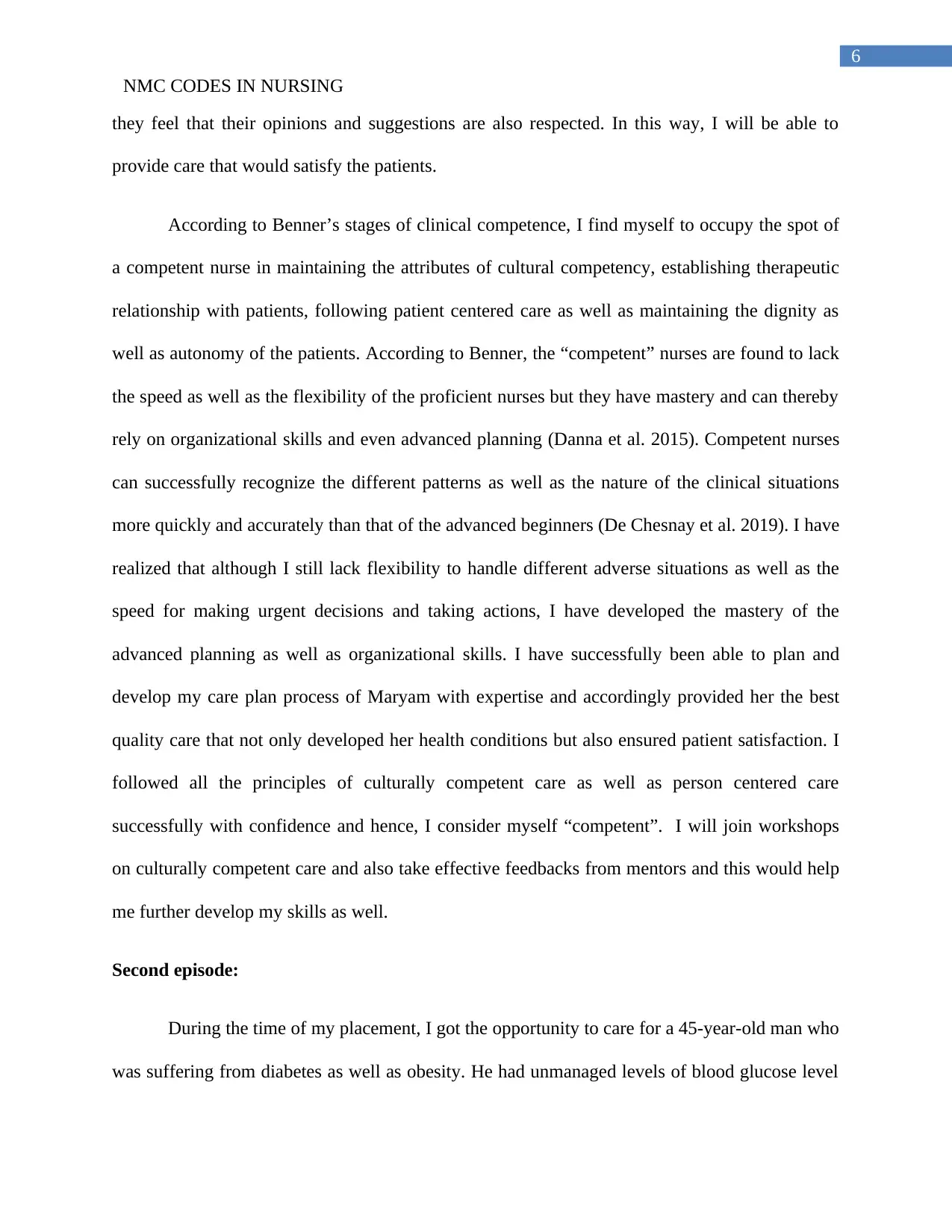
6
NMC CODES IN NURSING
they feel that their opinions and suggestions are also respected. In this way, I will be able to
provide care that would satisfy the patients.
According to Benner’s stages of clinical competence, I find myself to occupy the spot of
a competent nurse in maintaining the attributes of cultural competency, establishing therapeutic
relationship with patients, following patient centered care as well as maintaining the dignity as
well as autonomy of the patients. According to Benner, the “competent” nurses are found to lack
the speed as well as the flexibility of the proficient nurses but they have mastery and can thereby
rely on organizational skills and even advanced planning (Danna et al. 2015). Competent nurses
can successfully recognize the different patterns as well as the nature of the clinical situations
more quickly and accurately than that of the advanced beginners (De Chesnay et al. 2019). I have
realized that although I still lack flexibility to handle different adverse situations as well as the
speed for making urgent decisions and taking actions, I have developed the mastery of the
advanced planning as well as organizational skills. I have successfully been able to plan and
develop my care plan process of Maryam with expertise and accordingly provided her the best
quality care that not only developed her health conditions but also ensured patient satisfaction. I
followed all the principles of culturally competent care as well as person centered care
successfully with confidence and hence, I consider myself “competent”. I will join workshops
on culturally competent care and also take effective feedbacks from mentors and this would help
me further develop my skills as well.
Second episode:
During the time of my placement, I got the opportunity to care for a 45-year-old man who
was suffering from diabetes as well as obesity. He had unmanaged levels of blood glucose level
NMC CODES IN NURSING
they feel that their opinions and suggestions are also respected. In this way, I will be able to
provide care that would satisfy the patients.
According to Benner’s stages of clinical competence, I find myself to occupy the spot of
a competent nurse in maintaining the attributes of cultural competency, establishing therapeutic
relationship with patients, following patient centered care as well as maintaining the dignity as
well as autonomy of the patients. According to Benner, the “competent” nurses are found to lack
the speed as well as the flexibility of the proficient nurses but they have mastery and can thereby
rely on organizational skills and even advanced planning (Danna et al. 2015). Competent nurses
can successfully recognize the different patterns as well as the nature of the clinical situations
more quickly and accurately than that of the advanced beginners (De Chesnay et al. 2019). I have
realized that although I still lack flexibility to handle different adverse situations as well as the
speed for making urgent decisions and taking actions, I have developed the mastery of the
advanced planning as well as organizational skills. I have successfully been able to plan and
develop my care plan process of Maryam with expertise and accordingly provided her the best
quality care that not only developed her health conditions but also ensured patient satisfaction. I
followed all the principles of culturally competent care as well as person centered care
successfully with confidence and hence, I consider myself “competent”. I will join workshops
on culturally competent care and also take effective feedbacks from mentors and this would help
me further develop my skills as well.
Second episode:
During the time of my placement, I got the opportunity to care for a 45-year-old man who
was suffering from diabetes as well as obesity. He had unmanaged levels of blood glucose level
Paraphrase This Document
Need a fresh take? Get an instant paraphrase of this document with our AI Paraphraser
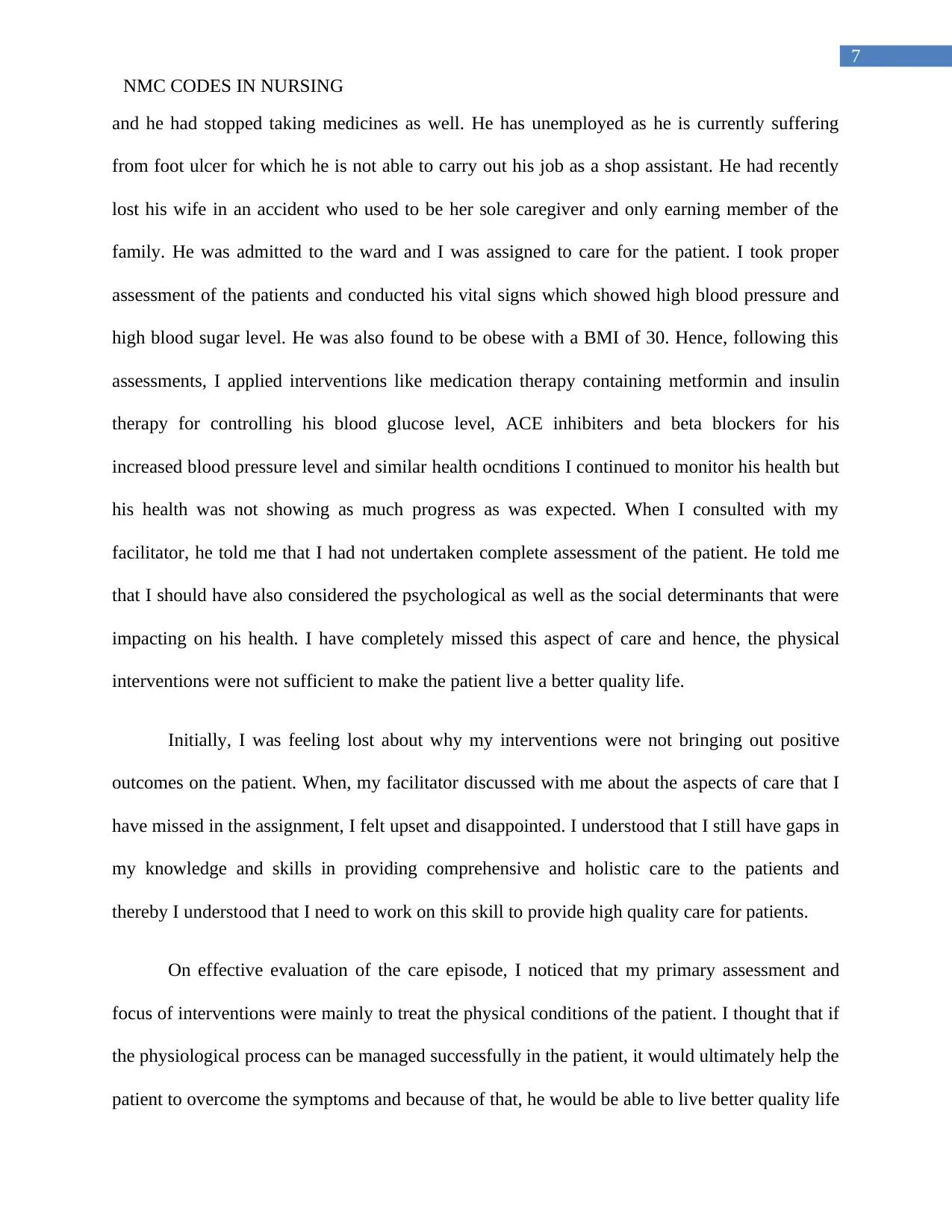
7
NMC CODES IN NURSING
and he had stopped taking medicines as well. He has unemployed as he is currently suffering
from foot ulcer for which he is not able to carry out his job as a shop assistant. He had recently
lost his wife in an accident who used to be her sole caregiver and only earning member of the
family. He was admitted to the ward and I was assigned to care for the patient. I took proper
assessment of the patients and conducted his vital signs which showed high blood pressure and
high blood sugar level. He was also found to be obese with a BMI of 30. Hence, following this
assessments, I applied interventions like medication therapy containing metformin and insulin
therapy for controlling his blood glucose level, ACE inhibiters and beta blockers for his
increased blood pressure level and similar health ocnditions I continued to monitor his health but
his health was not showing as much progress as was expected. When I consulted with my
facilitator, he told me that I had not undertaken complete assessment of the patient. He told me
that I should have also considered the psychological as well as the social determinants that were
impacting on his health. I have completely missed this aspect of care and hence, the physical
interventions were not sufficient to make the patient live a better quality life.
Initially, I was feeling lost about why my interventions were not bringing out positive
outcomes on the patient. When, my facilitator discussed with me about the aspects of care that I
have missed in the assignment, I felt upset and disappointed. I understood that I still have gaps in
my knowledge and skills in providing comprehensive and holistic care to the patients and
thereby I understood that I need to work on this skill to provide high quality care for patients.
On effective evaluation of the care episode, I noticed that my primary assessment and
focus of interventions were mainly to treat the physical conditions of the patient. I thought that if
the physiological process can be managed successfully in the patient, it would ultimately help the
patient to overcome the symptoms and because of that, he would be able to live better quality life
NMC CODES IN NURSING
and he had stopped taking medicines as well. He has unemployed as he is currently suffering
from foot ulcer for which he is not able to carry out his job as a shop assistant. He had recently
lost his wife in an accident who used to be her sole caregiver and only earning member of the
family. He was admitted to the ward and I was assigned to care for the patient. I took proper
assessment of the patients and conducted his vital signs which showed high blood pressure and
high blood sugar level. He was also found to be obese with a BMI of 30. Hence, following this
assessments, I applied interventions like medication therapy containing metformin and insulin
therapy for controlling his blood glucose level, ACE inhibiters and beta blockers for his
increased blood pressure level and similar health ocnditions I continued to monitor his health but
his health was not showing as much progress as was expected. When I consulted with my
facilitator, he told me that I had not undertaken complete assessment of the patient. He told me
that I should have also considered the psychological as well as the social determinants that were
impacting on his health. I have completely missed this aspect of care and hence, the physical
interventions were not sufficient to make the patient live a better quality life.
Initially, I was feeling lost about why my interventions were not bringing out positive
outcomes on the patient. When, my facilitator discussed with me about the aspects of care that I
have missed in the assignment, I felt upset and disappointed. I understood that I still have gaps in
my knowledge and skills in providing comprehensive and holistic care to the patients and
thereby I understood that I need to work on this skill to provide high quality care for patients.
On effective evaluation of the care episode, I noticed that my primary assessment and
focus of interventions were mainly to treat the physical conditions of the patient. I thought that if
the physiological process can be managed successfully in the patient, it would ultimately help the
patient to overcome the symptoms and because of that, he would be able to live better quality life
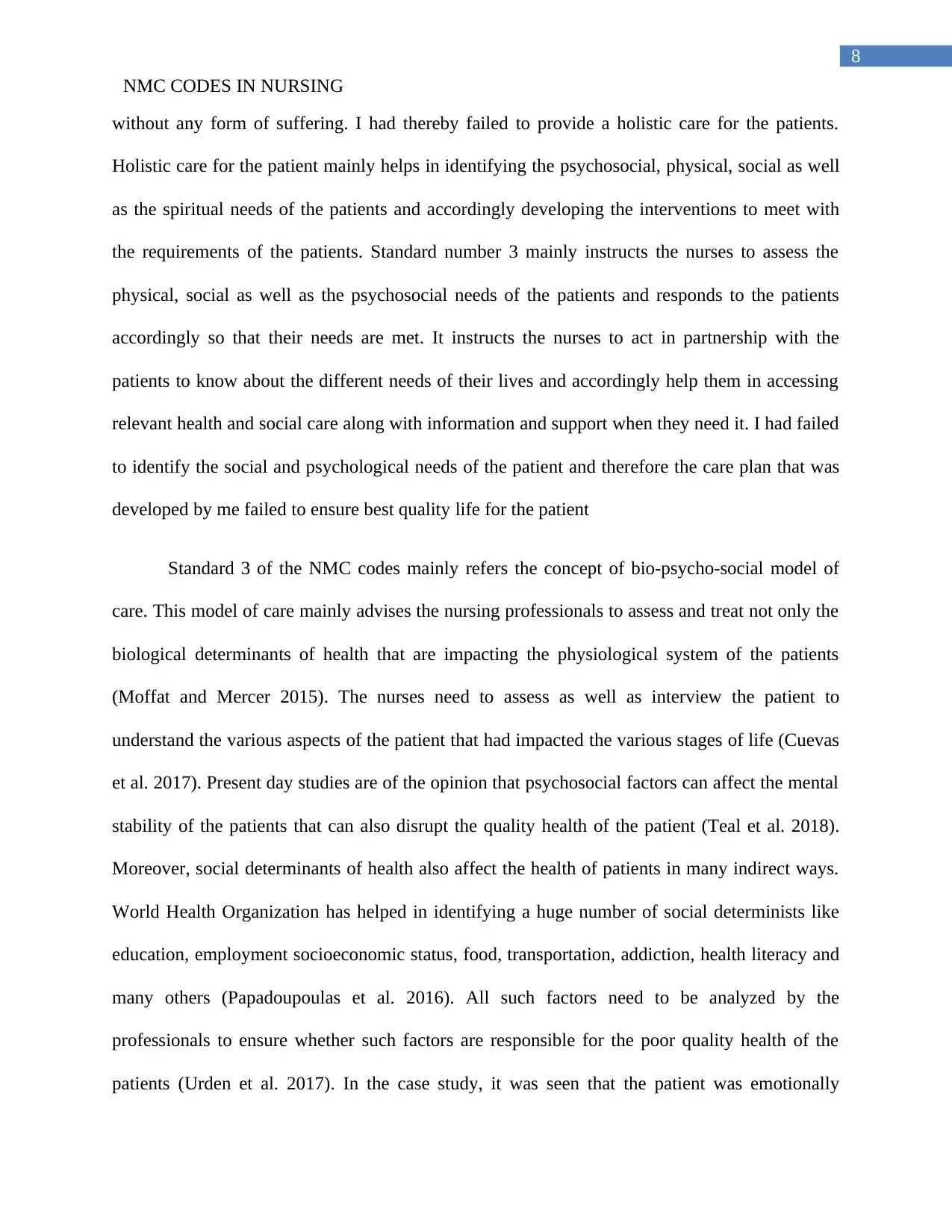
8
NMC CODES IN NURSING
without any form of suffering. I had thereby failed to provide a holistic care for the patients.
Holistic care for the patient mainly helps in identifying the psychosocial, physical, social as well
as the spiritual needs of the patients and accordingly developing the interventions to meet with
the requirements of the patients. Standard number 3 mainly instructs the nurses to assess the
physical, social as well as the psychosocial needs of the patients and responds to the patients
accordingly so that their needs are met. It instructs the nurses to act in partnership with the
patients to know about the different needs of their lives and accordingly help them in accessing
relevant health and social care along with information and support when they need it. I had failed
to identify the social and psychological needs of the patient and therefore the care plan that was
developed by me failed to ensure best quality life for the patient
Standard 3 of the NMC codes mainly refers the concept of bio-psycho-social model of
care. This model of care mainly advises the nursing professionals to assess and treat not only the
biological determinants of health that are impacting the physiological system of the patients
(Moffat and Mercer 2015). The nurses need to assess as well as interview the patient to
understand the various aspects of the patient that had impacted the various stages of life (Cuevas
et al. 2017). Present day studies are of the opinion that psychosocial factors can affect the mental
stability of the patients that can also disrupt the quality health of the patient (Teal et al. 2018).
Moreover, social determinants of health also affect the health of patients in many indirect ways.
World Health Organization has helped in identifying a huge number of social determinists like
education, employment socioeconomic status, food, transportation, addiction, health literacy and
many others (Papadoupoulas et al. 2016). All such factors need to be analyzed by the
professionals to ensure whether such factors are responsible for the poor quality health of the
patients (Urden et al. 2017). In the case study, it was seen that the patient was emotionally
NMC CODES IN NURSING
without any form of suffering. I had thereby failed to provide a holistic care for the patients.
Holistic care for the patient mainly helps in identifying the psychosocial, physical, social as well
as the spiritual needs of the patients and accordingly developing the interventions to meet with
the requirements of the patients. Standard number 3 mainly instructs the nurses to assess the
physical, social as well as the psychosocial needs of the patients and responds to the patients
accordingly so that their needs are met. It instructs the nurses to act in partnership with the
patients to know about the different needs of their lives and accordingly help them in accessing
relevant health and social care along with information and support when they need it. I had failed
to identify the social and psychological needs of the patient and therefore the care plan that was
developed by me failed to ensure best quality life for the patient
Standard 3 of the NMC codes mainly refers the concept of bio-psycho-social model of
care. This model of care mainly advises the nursing professionals to assess and treat not only the
biological determinants of health that are impacting the physiological system of the patients
(Moffat and Mercer 2015). The nurses need to assess as well as interview the patient to
understand the various aspects of the patient that had impacted the various stages of life (Cuevas
et al. 2017). Present day studies are of the opinion that psychosocial factors can affect the mental
stability of the patients that can also disrupt the quality health of the patient (Teal et al. 2018).
Moreover, social determinants of health also affect the health of patients in many indirect ways.
World Health Organization has helped in identifying a huge number of social determinists like
education, employment socioeconomic status, food, transportation, addiction, health literacy and
many others (Papadoupoulas et al. 2016). All such factors need to be analyzed by the
professionals to ensure whether such factors are responsible for the poor quality health of the
patients (Urden et al. 2017). In the case study, it was seen that the patient was emotionally
⊘ This is a preview!⊘
Do you want full access?
Subscribe today to unlock all pages.

Trusted by 1+ million students worldwide
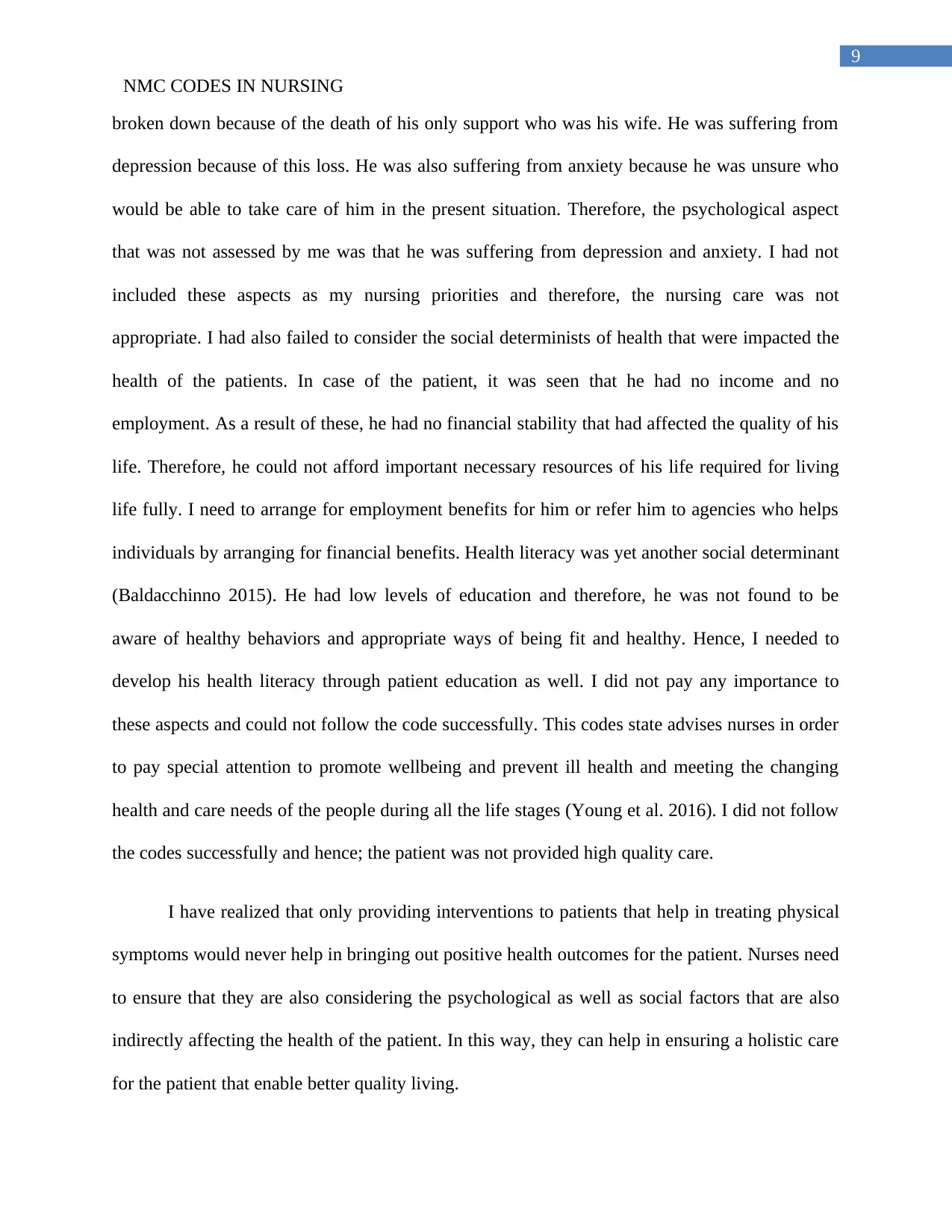
9
NMC CODES IN NURSING
broken down because of the death of his only support who was his wife. He was suffering from
depression because of this loss. He was also suffering from anxiety because he was unsure who
would be able to take care of him in the present situation. Therefore, the psychological aspect
that was not assessed by me was that he was suffering from depression and anxiety. I had not
included these aspects as my nursing priorities and therefore, the nursing care was not
appropriate. I had also failed to consider the social determinists of health that were impacted the
health of the patients. In case of the patient, it was seen that he had no income and no
employment. As a result of these, he had no financial stability that had affected the quality of his
life. Therefore, he could not afford important necessary resources of his life required for living
life fully. I need to arrange for employment benefits for him or refer him to agencies who helps
individuals by arranging for financial benefits. Health literacy was yet another social determinant
(Baldacchinno 2015). He had low levels of education and therefore, he was not found to be
aware of healthy behaviors and appropriate ways of being fit and healthy. Hence, I needed to
develop his health literacy through patient education as well. I did not pay any importance to
these aspects and could not follow the code successfully. This codes state advises nurses in order
to pay special attention to promote wellbeing and prevent ill health and meeting the changing
health and care needs of the people during all the life stages (Young et al. 2016). I did not follow
the codes successfully and hence; the patient was not provided high quality care.
I have realized that only providing interventions to patients that help in treating physical
symptoms would never help in bringing out positive health outcomes for the patient. Nurses need
to ensure that they are also considering the psychological as well as social factors that are also
indirectly affecting the health of the patient. In this way, they can help in ensuring a holistic care
for the patient that enable better quality living.
NMC CODES IN NURSING
broken down because of the death of his only support who was his wife. He was suffering from
depression because of this loss. He was also suffering from anxiety because he was unsure who
would be able to take care of him in the present situation. Therefore, the psychological aspect
that was not assessed by me was that he was suffering from depression and anxiety. I had not
included these aspects as my nursing priorities and therefore, the nursing care was not
appropriate. I had also failed to consider the social determinists of health that were impacted the
health of the patients. In case of the patient, it was seen that he had no income and no
employment. As a result of these, he had no financial stability that had affected the quality of his
life. Therefore, he could not afford important necessary resources of his life required for living
life fully. I need to arrange for employment benefits for him or refer him to agencies who helps
individuals by arranging for financial benefits. Health literacy was yet another social determinant
(Baldacchinno 2015). He had low levels of education and therefore, he was not found to be
aware of healthy behaviors and appropriate ways of being fit and healthy. Hence, I needed to
develop his health literacy through patient education as well. I did not pay any importance to
these aspects and could not follow the code successfully. This codes state advises nurses in order
to pay special attention to promote wellbeing and prevent ill health and meeting the changing
health and care needs of the people during all the life stages (Young et al. 2016). I did not follow
the codes successfully and hence; the patient was not provided high quality care.
I have realized that only providing interventions to patients that help in treating physical
symptoms would never help in bringing out positive health outcomes for the patient. Nurses need
to ensure that they are also considering the psychological as well as social factors that are also
indirectly affecting the health of the patient. In this way, they can help in ensuring a holistic care
for the patient that enable better quality living.
Paraphrase This Document
Need a fresh take? Get an instant paraphrase of this document with our AI Paraphraser
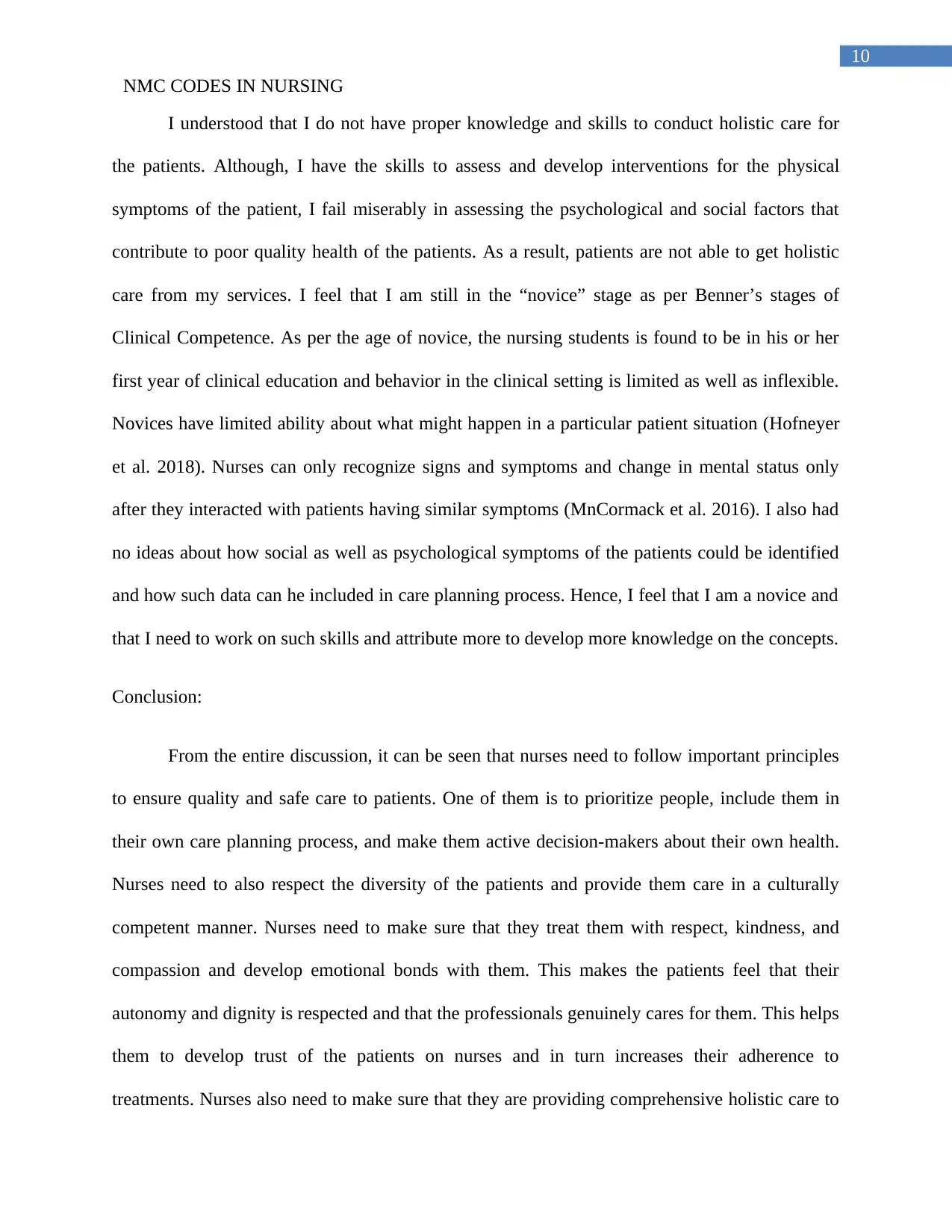
10
NMC CODES IN NURSING
I understood that I do not have proper knowledge and skills to conduct holistic care for
the patients. Although, I have the skills to assess and develop interventions for the physical
symptoms of the patient, I fail miserably in assessing the psychological and social factors that
contribute to poor quality health of the patients. As a result, patients are not able to get holistic
care from my services. I feel that I am still in the “novice” stage as per Benner’s stages of
Clinical Competence. As per the age of novice, the nursing students is found to be in his or her
first year of clinical education and behavior in the clinical setting is limited as well as inflexible.
Novices have limited ability about what might happen in a particular patient situation (Hofneyer
et al. 2018). Nurses can only recognize signs and symptoms and change in mental status only
after they interacted with patients having similar symptoms (MnCormack et al. 2016). I also had
no ideas about how social as well as psychological symptoms of the patients could be identified
and how such data can he included in care planning process. Hence, I feel that I am a novice and
that I need to work on such skills and attribute more to develop more knowledge on the concepts.
Conclusion:
From the entire discussion, it can be seen that nurses need to follow important principles
to ensure quality and safe care to patients. One of them is to prioritize people, include them in
their own care planning process, and make them active decision-makers about their own health.
Nurses need to also respect the diversity of the patients and provide them care in a culturally
competent manner. Nurses need to make sure that they treat them with respect, kindness, and
compassion and develop emotional bonds with them. This makes the patients feel that their
autonomy and dignity is respected and that the professionals genuinely cares for them. This helps
them to develop trust of the patients on nurses and in turn increases their adherence to
treatments. Nurses also need to make sure that they are providing comprehensive holistic care to
NMC CODES IN NURSING
I understood that I do not have proper knowledge and skills to conduct holistic care for
the patients. Although, I have the skills to assess and develop interventions for the physical
symptoms of the patient, I fail miserably in assessing the psychological and social factors that
contribute to poor quality health of the patients. As a result, patients are not able to get holistic
care from my services. I feel that I am still in the “novice” stage as per Benner’s stages of
Clinical Competence. As per the age of novice, the nursing students is found to be in his or her
first year of clinical education and behavior in the clinical setting is limited as well as inflexible.
Novices have limited ability about what might happen in a particular patient situation (Hofneyer
et al. 2018). Nurses can only recognize signs and symptoms and change in mental status only
after they interacted with patients having similar symptoms (MnCormack et al. 2016). I also had
no ideas about how social as well as psychological symptoms of the patients could be identified
and how such data can he included in care planning process. Hence, I feel that I am a novice and
that I need to work on such skills and attribute more to develop more knowledge on the concepts.
Conclusion:
From the entire discussion, it can be seen that nurses need to follow important principles
to ensure quality and safe care to patients. One of them is to prioritize people, include them in
their own care planning process, and make them active decision-makers about their own health.
Nurses need to also respect the diversity of the patients and provide them care in a culturally
competent manner. Nurses need to make sure that they treat them with respect, kindness, and
compassion and develop emotional bonds with them. This makes the patients feel that their
autonomy and dignity is respected and that the professionals genuinely cares for them. This helps
them to develop trust of the patients on nurses and in turn increases their adherence to
treatments. Nurses also need to make sure that they are providing comprehensive holistic care to
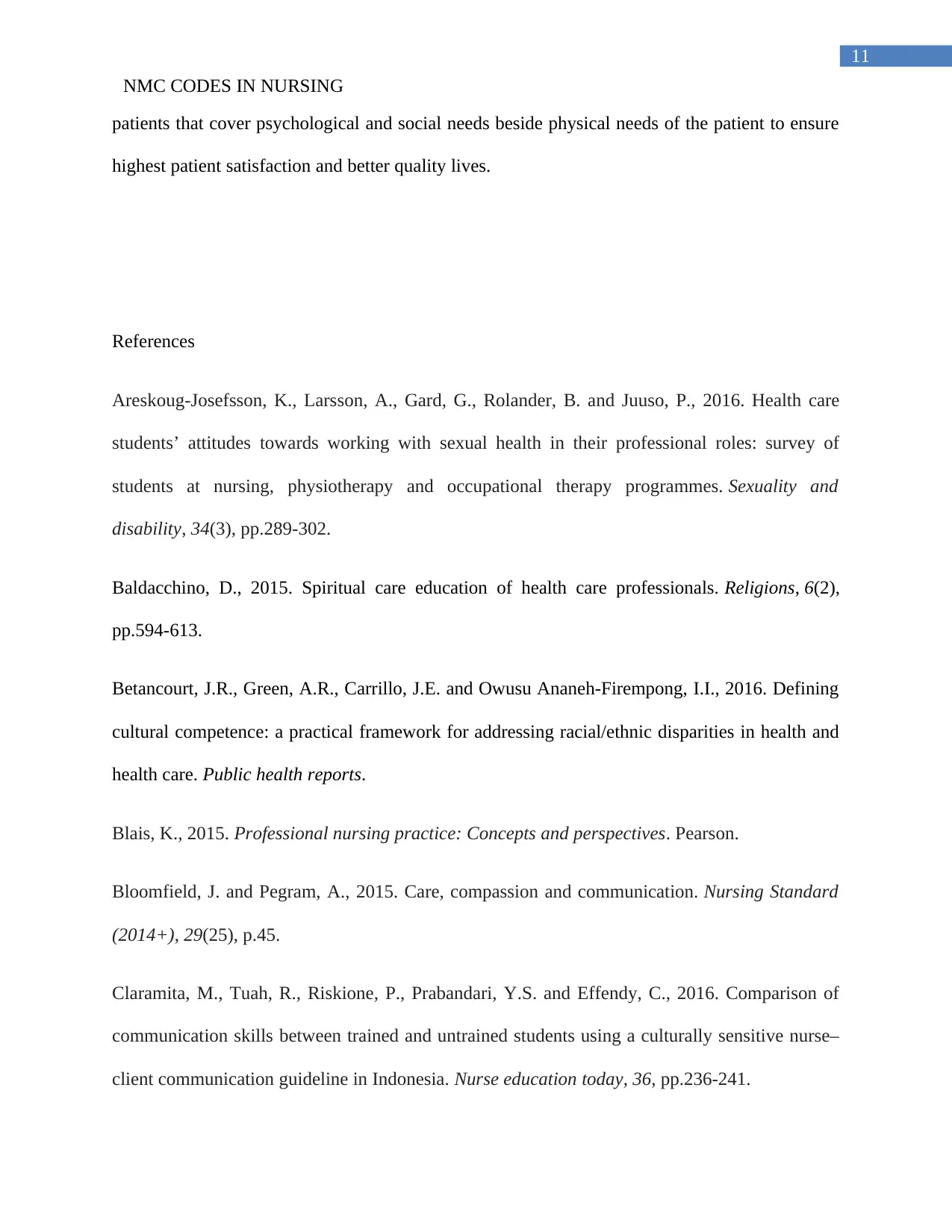
11
NMC CODES IN NURSING
patients that cover psychological and social needs beside physical needs of the patient to ensure
highest patient satisfaction and better quality lives.
References
Areskoug-Josefsson, K., Larsson, A., Gard, G., Rolander, B. and Juuso, P., 2016. Health care
students’ attitudes towards working with sexual health in their professional roles: survey of
students at nursing, physiotherapy and occupational therapy programmes. Sexuality and
disability, 34(3), pp.289-302.
Baldacchino, D., 2015. Spiritual care education of health care professionals. Religions, 6(2),
pp.594-613.
Betancourt, J.R., Green, A.R., Carrillo, J.E. and Owusu Ananeh-Firempong, I.I., 2016. Defining
cultural competence: a practical framework for addressing racial/ethnic disparities in health and
health care. Public health reports.
Blais, K., 2015. Professional nursing practice: Concepts and perspectives. Pearson.
Bloomfield, J. and Pegram, A., 2015. Care, compassion and communication. Nursing Standard
(2014+), 29(25), p.45.
Claramita, M., Tuah, R., Riskione, P., Prabandari, Y.S. and Effendy, C., 2016. Comparison of
communication skills between trained and untrained students using a culturally sensitive nurse–
client communication guideline in Indonesia. Nurse education today, 36, pp.236-241.
NMC CODES IN NURSING
patients that cover psychological and social needs beside physical needs of the patient to ensure
highest patient satisfaction and better quality lives.
References
Areskoug-Josefsson, K., Larsson, A., Gard, G., Rolander, B. and Juuso, P., 2016. Health care
students’ attitudes towards working with sexual health in their professional roles: survey of
students at nursing, physiotherapy and occupational therapy programmes. Sexuality and
disability, 34(3), pp.289-302.
Baldacchino, D., 2015. Spiritual care education of health care professionals. Religions, 6(2),
pp.594-613.
Betancourt, J.R., Green, A.R., Carrillo, J.E. and Owusu Ananeh-Firempong, I.I., 2016. Defining
cultural competence: a practical framework for addressing racial/ethnic disparities in health and
health care. Public health reports.
Blais, K., 2015. Professional nursing practice: Concepts and perspectives. Pearson.
Bloomfield, J. and Pegram, A., 2015. Care, compassion and communication. Nursing Standard
(2014+), 29(25), p.45.
Claramita, M., Tuah, R., Riskione, P., Prabandari, Y.S. and Effendy, C., 2016. Comparison of
communication skills between trained and untrained students using a culturally sensitive nurse–
client communication guideline in Indonesia. Nurse education today, 36, pp.236-241.
⊘ This is a preview!⊘
Do you want full access?
Subscribe today to unlock all pages.

Trusted by 1+ million students worldwide
1 out of 15
Related Documents
Your All-in-One AI-Powered Toolkit for Academic Success.
+13062052269
info@desklib.com
Available 24*7 on WhatsApp / Email
![[object Object]](/_next/static/media/star-bottom.7253800d.svg)
Unlock your academic potential
Copyright © 2020–2026 A2Z Services. All Rights Reserved. Developed and managed by ZUCOL.




